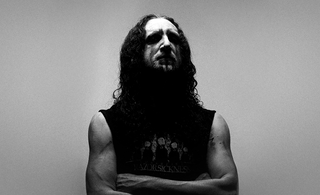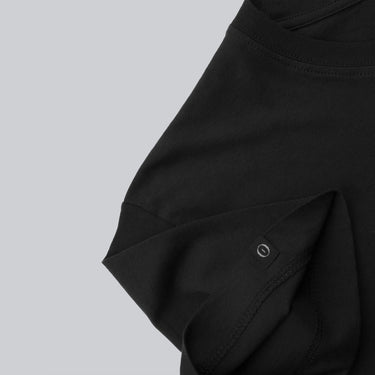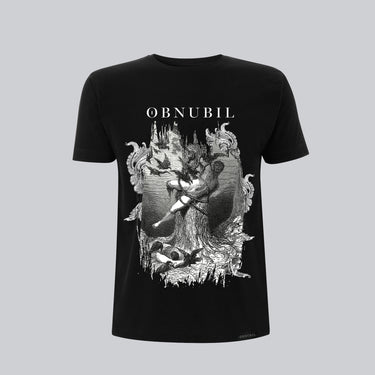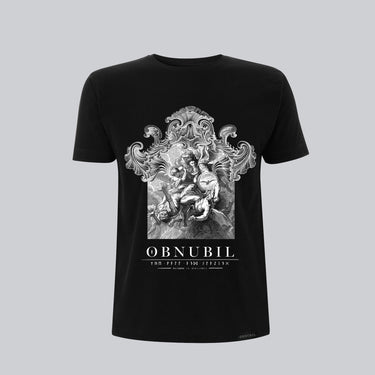
In the often chaotic and visceral world of black metal, few artists manage to weave together intellectual rigor and raw emotional power as seamlessly as Johannes Climacus (A.K.). Known for his work with bands like Decline of the I, Merrimack, and Vorkreist, Johannes stands at the crossroads of music and philosophy, turning existential inquiry into haunting soundscapes and searing vocal performances. His artistic vision draws as much from Søren Kierkegaard as it does from the harsh traditions of French black metal. With Decline of the I in particular, Climacus explores the inner fractures of the self, the conflict between individual will and societal expectation, and the surreal dance between meaning and despair. In this rare and thought-provoking interview, we venture beyond and delve into the philosophical foundations behind his music.

INTERVIEW
OBNUBIL: Hey Johannes! I really appreciate you diving into some unconventional questions with me today. Let’s start with your musical journey—every artist has that defining path that led them here. If we were crafting a cinematic retelling of your story, what would be the standout scenes? Was there a specific moment that completely rewired your understanding of music—maybe an album that hit like a thunderbolt? Or was your dive into black metal more of a slow, inevitable pull, shaped by philosophy, literature, and the sheer intensity of the genre?
Johannes Climacus (A.K.): As far back as I can remember, music has always been incredibly important to me. I think I became a fan of a band—A-ha—when I was five or six years old. I must have already had a certain inclination toward Norway!
The real revelation, like for many people of my generation, came when I discovered Guns N’ Roses with "You Could Be Mine" when Terminator 2 came out. That’s when I realized that guitar-driven music was made for me—around 1992.
Then around 1993–1994, I heard about black metal for the first time, even before hearing a single note: a tiny article in a magazine about the release of De Mysteriis Dom Sathanas, mentioning the murders and the burned churches. I was fascinated by these stories because, for once, it felt like it was more than just music.
Almost by chance, I stumbled upon Immortal’s first album, and finally De Mysteriis—and from the very first notes, I knew I had found my chapel.
I was lucky to discover the genre at its peak. Within a few weeks, I also discovered Emperor, Abigor, Satyricon, Cradle of Filth (come on, everyone loved them back then!!), etc. It was an incredible period, intense in both discovery and life (adolescence).
I think that’s why so many from my generation have remained faithful to those early sensations. We witnessed the birth of something. We were contemporaries of it all. And of course, I wanted to be part of that dark energy by making music myself. I felt it was the language closest to what I was feeling, something no words could convey.
OBNUBIL: Your name, Johannes Climacus, is directly tied to Kierkegaard, who wrote under that pseudonym to explore ideas of doubt and paradox. If your music could be described as a philosophical concept rather than a genre, what would it be? Would black metal, as you see it, be a sonic representation of the Absurd, an act of the Leap of Faith, or a manifestation of Nietzsche’s Eternal Recurrence? How does existential thought shape the way you approach composition and performance?
Johannes Climacus (A.K.): Deep question. I like the concept of “disturbance” or “trouble.” Something that’s not pure, that disrupts something smooth, academic, or too monolithic. That’s how I approach the music of Decline of the I.
Its essence is black metal, but it’s not “true,” not “pure.” I fundamentally respect the tradition of black metal, its orthodoxy. But I think it’s precisely in its essence that it becomes interesting to disturb it.
That’s what was already happening in Norway in the ’90s. As soon as the foundations were laid, they were already being shaken (Ved Buens Ende, Mysticum, etc.).
I do see black metal as a sonic representation of the absurd, more than Nietzschean concepts (will to power, etc.). But that’s quite personal. I’m not trying to define what black metal is. Some purists would surely be more legitimate in giving a clear definition. Or maybe not.
Even though I tend toward intellectualization, it’s important not to overdo it. After all, there are punk roots in black metal too.
OBNUBIL: You’ve been involved in multiple extreme metal projects, each with its own identity and sonic vision. If Merrimack, Vorkreist, and Decline of the I were different gods in a dark pantheon, what would their domains be? Would one be a god of pure nihilism, another an entity of ritualistic chaos, and another a deity of introspection and despair? What would their followers have to sacrifice in order to gain favor with them?
Johannes Climacus (A.K.): Merrimack would probably be the god of wisdom, having existed for over 30 years. It’s seen a lot of the human world. So maybe it would demand the youth of its listeners as a sacrifice (though, sadly, I know there are fewer and fewer young ones!).
Vorkreist would be the god of chaos, because so much happened with that band. I’m thinking especially of the tragic death of LSK, one of the founding members. Absurd tours too. And then the impossibility of continuing, even though the desire is still there. Maybe organization and temperance should be offered to it as a sacrifice.
Decline of the I, god of doubt, would need serenity to fill all the anxieties that haunt its cult!
OBNUBIL: France has an incredibly rich history of philosophy, literature, and avant-garde movements, all of which seem to seep into your music’s themes and atmosphere. If you could play your music for any historical audience—be it poets in the 19th century, philosophers of the Enlightenment, or nihilists of the 20th century—who do you think would resonate most with your sound?
Johannes Climacus (A.K.): I think pretty much any historical figure would just feel like they’re hearing a thunderstorm passing by when listening to our music, haha!
Maybe I’d actually be more curious to play it for future generations, to see if I’ve captured something timeless, or if I’m completely just a reflection of my era.
We always think we’re so unique and free, when in fact we’re just conditioned by what surrounds us (I don’t believe in free will).
OBNUBIL: You’ve toured across various countries and black metal scenes, encountering different atmospheres and audiences. What’s the most surreal or unexpected experience you’ve had while performing? Have you ever felt like you were in a moment that belonged more in a surrealist film than in a black metal gig? Perhaps an eerie setting, an absurd audience reaction, or something deeply unsettling that still lingers in your mind?
Johannes Climacus (A.K.): I have a lot of strange memories. The first that comes to mind is a performance with Diapsiquir. I think it was in 2023, in a lesbian club that hosted concerts open to straight people on Wednesday nights.
Damien, the band’s leader, brought in a dominatrix and her submissive. I was doing samples/keyboards, and the guy got double-fisted at my feet by the mistress.
Later, a friend (now in a very well-known black metal band, haha) went on stage and started masturbating. Super intense.
I also remember a Vorkreist gig in Padova where the crowd lifted the barriers in front of the venue and beat them in rhythm with the intro of one of our songs.
Or more recently, last summer, we were playing an open-air festival in Austria with Merrimack, and we saw the storm slowly approaching.
Eventually, the power cut out during our set, and torrential rain poured down on the festival site for over an hour.
I also make music for moments like these.
OBNUBIL: If you could take one historical figure—musician, writer, or philosopher—on tour with you as a companion, who would be your ideal choice? Would it be someone who would challenge your perceptions, or someone who would amplify the atmosphere of the music? On the flip side, who would be an absolute nightmare to share a van with for weeks on end, someone whose presence would make touring unbearable?
Johannes Climacus (A.K.): I would’ve loved to meet Cioran, the Romanian philosopher, but I think his acid, brutally lucid gaze would ruin any tour vibe!
So maybe, on the contrary, someone who would lead us into wild adventures—like Lemmy, for example.
OBNUBIL: The concept of decay, decline, and existential dread permeates much of your work, presenting a vision of a crumbling world. But let’s flip the perspective for a moment: If you had to write a black metal album based on a utopian vision—one without suffering, despair, or existential crisis—what would it sound like? Would it still have the essence of black metal, or would it transform into something entirely different? Is the genre fundamentally tied to suffering, or could it evolve beyond it?
Johannes Climacus (A.K.): I find it hard to imagine this kind of music conveying positive feelings. I know the next Decline of the I album is meant to carry a bit of light.
But it will inevitably be by contrast. Those bright moments can only exist because they emerge from a dark, anxiety-filled mass.
I think black metal self-destructs if it strays from those dark emotions.
In fact, I think it’s very healthy to have a musical genre where all these murky depths can be exorcised.
And I find it interesting that there’s this gray area where it’s not clear whether we’re expressing these emotions to celebrate them, avoid them, or purge them.
Maybe by facing them, by celebrating them, they become unlivable—thus less powerful within us.
OBNUBIL: If you could perform a ritualistic black metal show in any location—real or fictional—with no limitations in terms of logistics or reality, where would it be? Would it be in a crumbling cathedral at the end of time, inside an abandoned mental asylum, or perhaps on the surface of a distant planet where sound behaves differently? What kind of elements would be involved in this performance, and what would make it the ultimate sonic ritual?
Johannes Climacus (A.K.): I’d like to play at the very end of time. For the final note of our concert to be the last vibration of air ever made, before an endless silence, the petrification of the universe.
And for that note to resonate in absolute nothingness, becoming a vestige, a fossilized testimony of a time when time still existed.
OBNUBIL: And, if Decline of the I were to be adapted into a psychological horror film, what would the plot be? Would it be a slow-burning existential nightmare, a descent into madness, or an abstract, non-linear experience where sound and visuals blur into something terrifyingly immersive? And if you could choose any director, living or dead, to bring this vision to life, who would be the one to capture the essence of your music in cinematic form?
Johannes Climacus (A.K.): What matters most to me is that music, which essentially conveys emotion through sound, shouldn’t be used to convey meaning, a message, Logos.
What I try to do is the opposite of film music.
Instead, imagine a film in service of the music—something non-linear, that follows cadences, repetitions, twists and morphs.
A visual object whose primary aim is not to make you think, but to make you feel. Percept rather than concept.
I don’t have a specific person in mind, to be honest—I don’t have a great visual culture.
Okay, maybe Tarkovsky, but more epileptic!
OBNUBIL: Black metal has often been linked to concepts of individualism, chaos, and anti-conformity. How do you personally interpret the core philosophy of black metal? Do you see it as a form of rebellion, an expression of inner philosophy, or something entirely different? Given that black metal has evolved in so many directions, do you think its original spirit of defiance still remains, or has it been reshaped by time and external influences?
Johannes Climacus (A.K.): As I said earlier, black metal can be disturbed. Like any cultural form, it has been.
The more it exists, the more it can be influenced and lose its purity.
That’s the fate of everything: no matter what we do, how much we twist ourselves in all directions, we are governed by entropy.
There’s no escaping it, not even black metal.
So, it’s hard to pin the concept down. Limiting it to rebellion doesn’t quite work.
Rebellion can’t function long-term—what happens when rebellion becomes institutionalized?
Do we rebel again and return to square one?
The same question applies to the figure of Satan. I’ll leave that debate to real Satanists.
OBNUBIL: Some say that black metal should remain an underground movement, protected from mainstream influence, while others argue that its evolution into different subgenres and experimental forms is essential for artistic growth. Where do you stand on this debate? Do you think that black metal should evolve naturally and absorb new influences, or is there a risk of it losing its raw and authentic essence if it strays too far from its roots?
Johannes Climacus (A.K.): I can hardly say that black metal must absolutely remain as it was in the beginning, since I myself make music derived from black metal, which I “disturb” in a way.
But I completely understand wanting to defend tradition.
And it’s not a good argument to tell a purist that their movement has to evolve.
I find it odd to arrive somewhere and deny or say that the essence—its origins—is “problematic.”
No one is forcing anyone to listen to black metal.
As that Britney Spears fan once said: “Leave Black Metal Alooone!”.
But if you want my personal definition : Black metal is the music that comes and goes between fith, diminished fith and augmented fith (or flat sixth).
OBNUBIL: Over the years, black metal has undergone significant transformations, from its raw, primitive origins to highly sophisticated and avant-garde interpretations. Do you feel that the genre still holds the same power and mystique it once did, or do you think some of its essence has been diluted by overexposure? Does black metal still have the ability to shock, provoke, and challenge, or has it become something more artistic and conceptual rather than dangerous?
Johannes Climacus (A.K.): Every artistic form goes through several stages. It's rarely both dangerous and mature, aged. The danger of black metal also came from its youth. It struck many with sheer shock.
But with time, things are eventually absorbed, digested—they become part of more popular culture. There are exhibitions, debates, films...
I don’t think black metal has lost its appeal, but it has undoubtedly transformed.
I think it's simply impossible to recapture the raw explosions of the early days. We need to accept the "becoming" of everything, and avoid getting stuck in the “it was better before” mindset.

OBNUBIL: If you had to define the “perfect” black metal album—whether it already exists or is yet to be written—what elements would it contain? Would it be purely atmospheric, raw and aggressive, deeply philosophical, or something entirely unorthodox? Does perfection in black metal even exist, or is it meant to be flawed, chaotic, and forever in flux?
Johannes Climacus (A.K.): Everything is already in De Mysteriis Dom Sathanas. That’s the perfect album, in my opinion.
But yes, I agree with the idea of flux. Even though that album is a cornerstone, that doesn’t mean we should stay silent afterward.
We’re left with the task of combining existing forms to create new arrangements.
But the creation of completely new forms, within this style, seems difficult to me.
OBNUBIL: In your opinion, can black metal be a spiritual experience? Some musicians and listeners see it as a form of artistic catharsis, others as a deeply ritualistic or even religious practice, and some as purely aesthetic. Where do you personally stand on this? Have you ever had moments while creating or performing music where you felt a transcendent or out-of-body experience? Can black metal tap into something beyond human comprehension, or is it simply an artistic expression rooted in philosophy and emotion?
Johannes Climacus (A.K.): As Cioran said, I’m a “mystic without God.” I believe in nothing truly transcendent, but I can still experience illusions of it—especially through music.
And particularly through black metal. It makes me feel, almost touch, celestial or infernal spaces—things far greater than myself.
Whether it’s a gateway to something above (or below—or elsewhere), or just an illusion, doesn’t really matter. What matters is the experience itself.
Ultimately, I think everything is explainable, even if we don’t have the ability yet. But that very gap is the source of all our creations—so it’s healthy not to know everything.
OBNUBIL: If Friedrich Nietzsche, Søren Kierkegaard, and Charles Baudelaire formed a black metal band, which one would play which instrument, and what would be the name of their debut album? More importantly, what would their music sound like? Would it be a chaotic, philosophical maelstrom, or something unexpectedly structured and profound?
Johannes Climacus (A.K.): It would be incredibly complicated to form a band with a Christian, a blasphemer, and someone who declares that God is dead.
But if they were forced to play together, maybe they’d make wall harsh noise, because the sum of everything they could express would be so vast that their music would encompass all the sounds and noises of the world: a child’s cry, the rustling of a leaf, terrifying thunder, an immense hammer strike, the caress of wind...
All of it layered would produce a definitive saturation, inaudible to humans—a white noise that cancels all others.
OBNUBIL: To finish off, I’d love to hear about what the future holds for you. Are there any exciting projects, collaborations, or upcoming releases that you’re currently working on? Anything followers should keep an eye out for in the near future?
Johannes Climacus (A.K.): I’m currently working on Abraham, which should be released around 2028 if all goes well. I already have a lot of ideas—I just need to organize them.
We’ll also be doing a few shows in the coming months.
OBNUBIL: It’s been an absolute pleasure getting to learn more about you, Johannes! Thank you so much for sharing your time and thoughts. Before we wrap up, is there anything you'd like to share with the readers or a message for your followers?
Johannes Climacus (A.K.): Thank you very much for this original interview! It was refreshing.
"Life is not enough."
Interview done April 2025. Photos by Void Revelations & Vagus Nox.









